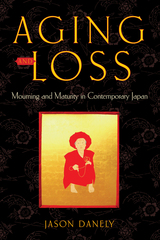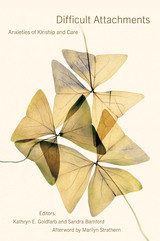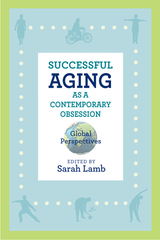3 books by Danely, Jason

Aging and Loss
Mourning and Maturity in Contemporary Japan
Danely, Jason
Rutgers University Press, 2015
By 2030, over 30% of the Japanese population will be 65 or older, foreshadowing the demographic changes occurring elsewhere in Asia and around the world. What can we learn from a study of the aging population of Japan and how can these findings inform a path forward for the elderly, their families, and for policy makers?
Based on nearly a decade of research, Aging and Loss examines how the landscape of aging is felt, understood, and embodied by older adults themselves. In detailed portraits, anthropologist Jason Danely delves into the everyday lives of older Japanese adults as they construct narratives through acts of reminiscence, social engagement and ritual practice, and reveals the pervasive cultural aesthetic of loss and of being a burden.
Based on nearly a decade of research, Aging and Loss examines how the landscape of aging is felt, understood, and embodied by older adults themselves. In detailed portraits, anthropologist Jason Danely delves into the everyday lives of older Japanese adults as they construct narratives through acts of reminiscence, social engagement and ritual practice, and reveals the pervasive cultural aesthetic of loss and of being a burden.
Through first-hand accounts of rituals in homes, cemeteries, and religious centers, Danely argues that what he calls the self-in-suspense can lead to the emergence of creative participation in an economy of care. In everyday rituals for the spirits, older adults exercise agency and reinterpret concerns of social abandonment within a meaningful cultural narrative and, by reimagining themselves and their place in the family through these rituals, older adults in Japan challenge popular attitudes about eldercare. Danely’s discussion of health and long-term care policy, and community welfare organizations, reveal a complex picture of Japan’s aging society.
[more]

Difficult Attachments
Anxieties of Kinship and Care
Kathryn E. Goldfarb
Rutgers University Press, 2025
Anthropologists have long considered kinship as the basis for social solidarity. Indeed, the idea that kinship is grounded in positive sociality has found its way into most anthropological accounts and has served as an orienting framework directing decades of scholarly research. But, what about when it is not? What about instances when kinship is anything but ‘warm and fuzzy’, but is characterized, instead, by neglect, violence, negative affect, or a lack of nurturance and care? In the three interlinked sections of this volume, the view that kinship is about “solidarity” and “care” is challenged by exploring how kin relations are not only about connection and inclusion, but are also about disconnection, exclusion, neglect, and violence. Kinship relationships that feel “positive” and “good” take a great deal of perseverance and work; there is nothing “natural” about kinship ties as being based on positive sociality. In these chapters, the contributors take seriously the contingency of kinship relations (the moments when kinship breaks down or is a source of suffering) and how this prompts scholars to develop new theoretical and methodological perspectives.
[more]

Successful Aging as a Contemporary Obsession
Global Perspectives
Lamb, Sarah
Rutgers University Press, 2017
In recent decades, the North American public has pursued an inspirational vision of successful aging—striving through medical technique and individual effort to eradicate the declines, vulnerabilities, and dependencies previously commonly associated with old age. On the face of it, this bold new vision of successful, healthy, and active aging is highly appealing. But it also rests on a deep cultural discomfort with aging and being old.
The contributors to Successful Aging as a Contemporary Obsession explore how the successful aging movement is playing out across five continents. Their chapters investigate a variety of people, including Catholic nuns in the United States; Hindu ashram dwellers; older American women seeking plastic surgery; aging African-American lesbians and gay men in the District of Columbia; Chicago home health care workers and their aging clients; Mexican men foregoing Viagra; dementia and Alzheimer sufferers in the United States and Brazil; and aging policies in Denmark, Poland, India, China, Japan, and Uganda. This book offers a fresh look at a major cultural and public health movement of our time, questioning what has become for many a taken-for-granted goal—aging in a way that almost denies aging itself.
The contributors to Successful Aging as a Contemporary Obsession explore how the successful aging movement is playing out across five continents. Their chapters investigate a variety of people, including Catholic nuns in the United States; Hindu ashram dwellers; older American women seeking plastic surgery; aging African-American lesbians and gay men in the District of Columbia; Chicago home health care workers and their aging clients; Mexican men foregoing Viagra; dementia and Alzheimer sufferers in the United States and Brazil; and aging policies in Denmark, Poland, India, China, Japan, and Uganda. This book offers a fresh look at a major cultural and public health movement of our time, questioning what has become for many a taken-for-granted goal—aging in a way that almost denies aging itself.
[more]
READERS
Browse our collection.
PUBLISHERS
See BiblioVault's publisher services.
STUDENT SERVICES
Files for college accessibility offices.
UChicago Accessibility Resources
home | accessibility | search | about | contact us
BiblioVault ® 2001 - 2024
The University of Chicago Press









